Emotional Intelligence: A Key Trait for Effective Leaders
VerifiedAdded on 2020/03/01
|11
|2612
|66
Essay
AI Summary
This essay delves into the critical role of emotional intelligence (EI) in effective leadership and its impact on workplace dynamics. It emphasizes that EI, encompassing traits like self-awareness, empathy, self-regulation, motivation, and social skills, is essential for leaders to manage diverse teams and foster positive relationships. The essay highlights how emotionally intelligent leaders can better understand and connect with employees, leading to improved communication, teamwork, and overall job performance. It also acknowledges that emotional intelligence is a two-way street, requiring employees to possess similar skills to support leaders effectively. The reflective essay component provides a personal analysis of the writer's understanding of EI, highlighting its principles and how they can be applied to both personal and professional life. It concludes by emphasizing the importance of balance in utilizing EI to avoid manipulation and maintain a practical approach to work.
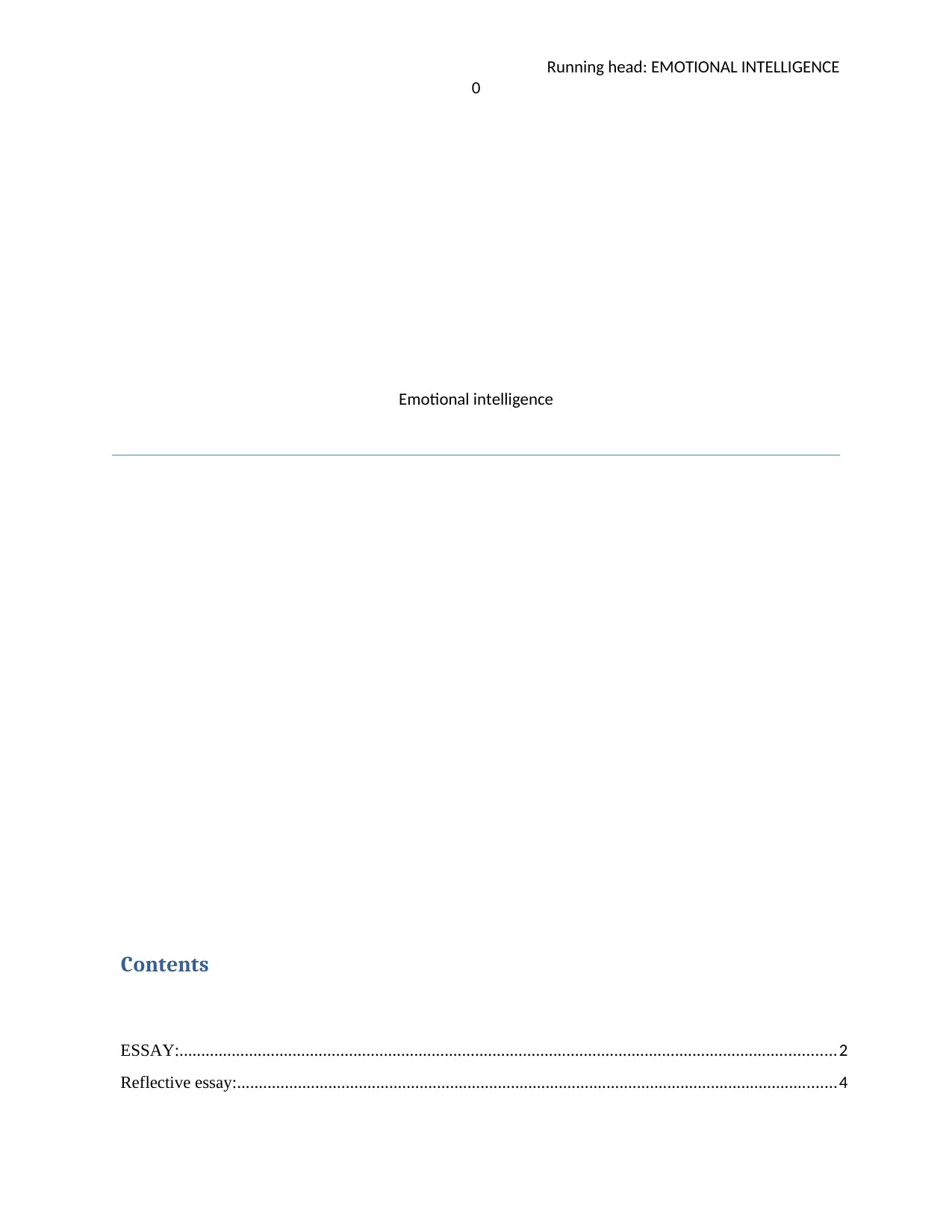
Running head: EMOTIONAL INTELLIGENCE
0
Emotional intelligence
Contents
ESSAY:.......................................................................................................................................................2
Reflective essay:..........................................................................................................................................4
0
Emotional intelligence
Contents
ESSAY:.......................................................................................................................................................2
Reflective essay:..........................................................................................................................................4
Paraphrase This Document
Need a fresh take? Get an instant paraphrase of this document with our AI Paraphraser

EMOTIONAL INTELLIGENCE
1
References:..................................................................................................................................................5
1
References:..................................................................................................................................................5
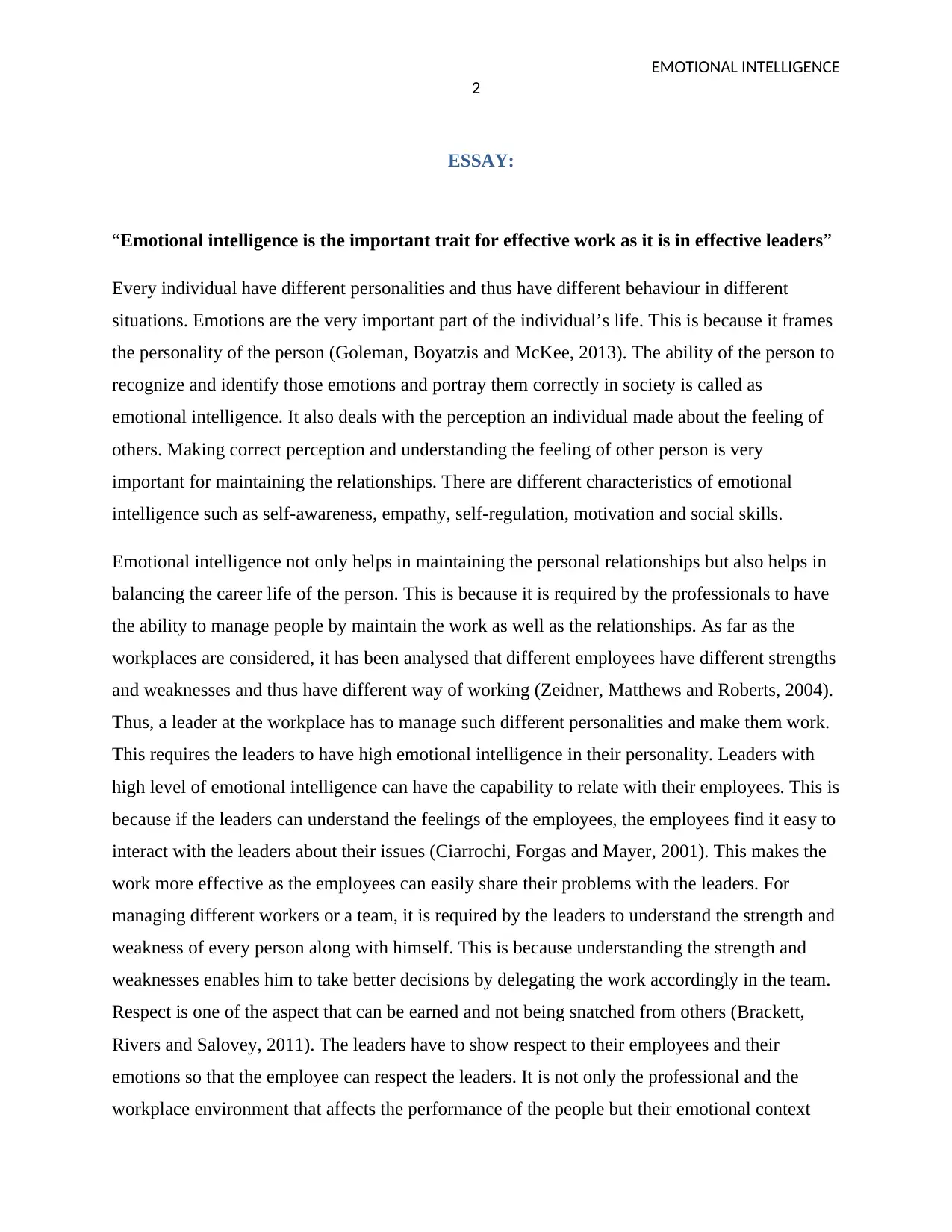
EMOTIONAL INTELLIGENCE
2
ESSAY:
“Emotional intelligence is the important trait for effective work as it is in effective leaders”
Every individual have different personalities and thus have different behaviour in different
situations. Emotions are the very important part of the individual’s life. This is because it frames
the personality of the person (Goleman, Boyatzis and McKee, 2013). The ability of the person to
recognize and identify those emotions and portray them correctly in society is called as
emotional intelligence. It also deals with the perception an individual made about the feeling of
others. Making correct perception and understanding the feeling of other person is very
important for maintaining the relationships. There are different characteristics of emotional
intelligence such as self-awareness, empathy, self-regulation, motivation and social skills.
Emotional intelligence not only helps in maintaining the personal relationships but also helps in
balancing the career life of the person. This is because it is required by the professionals to have
the ability to manage people by maintain the work as well as the relationships. As far as the
workplaces are considered, it has been analysed that different employees have different strengths
and weaknesses and thus have different way of working (Zeidner, Matthews and Roberts, 2004).
Thus, a leader at the workplace has to manage such different personalities and make them work.
This requires the leaders to have high emotional intelligence in their personality. Leaders with
high level of emotional intelligence can have the capability to relate with their employees. This is
because if the leaders can understand the feelings of the employees, the employees find it easy to
interact with the leaders about their issues (Ciarrochi, Forgas and Mayer, 2001). This makes the
work more effective as the employees can easily share their problems with the leaders. For
managing different workers or a team, it is required by the leaders to understand the strength and
weakness of every person along with himself. This is because understanding the strength and
weaknesses enables him to take better decisions by delegating the work accordingly in the team.
Respect is one of the aspect that can be earned and not being snatched from others (Brackett,
Rivers and Salovey, 2011). The leaders have to show respect to their employees and their
emotions so that the employee can respect the leaders. It is not only the professional and the
workplace environment that affects the performance of the people but their emotional context
2
ESSAY:
“Emotional intelligence is the important trait for effective work as it is in effective leaders”
Every individual have different personalities and thus have different behaviour in different
situations. Emotions are the very important part of the individual’s life. This is because it frames
the personality of the person (Goleman, Boyatzis and McKee, 2013). The ability of the person to
recognize and identify those emotions and portray them correctly in society is called as
emotional intelligence. It also deals with the perception an individual made about the feeling of
others. Making correct perception and understanding the feeling of other person is very
important for maintaining the relationships. There are different characteristics of emotional
intelligence such as self-awareness, empathy, self-regulation, motivation and social skills.
Emotional intelligence not only helps in maintaining the personal relationships but also helps in
balancing the career life of the person. This is because it is required by the professionals to have
the ability to manage people by maintain the work as well as the relationships. As far as the
workplaces are considered, it has been analysed that different employees have different strengths
and weaknesses and thus have different way of working (Zeidner, Matthews and Roberts, 2004).
Thus, a leader at the workplace has to manage such different personalities and make them work.
This requires the leaders to have high emotional intelligence in their personality. Leaders with
high level of emotional intelligence can have the capability to relate with their employees. This is
because if the leaders can understand the feelings of the employees, the employees find it easy to
interact with the leaders about their issues (Ciarrochi, Forgas and Mayer, 2001). This makes the
work more effective as the employees can easily share their problems with the leaders. For
managing different workers or a team, it is required by the leaders to understand the strength and
weakness of every person along with himself. This is because understanding the strength and
weaknesses enables him to take better decisions by delegating the work accordingly in the team.
Respect is one of the aspect that can be earned and not being snatched from others (Brackett,
Rivers and Salovey, 2011). The leaders have to show respect to their employees and their
emotions so that the employee can respect the leaders. It is not only the professional and the
workplace environment that affects the performance of the people but their emotional context
⊘ This is a preview!⊘
Do you want full access?
Subscribe today to unlock all pages.

Trusted by 1+ million students worldwide
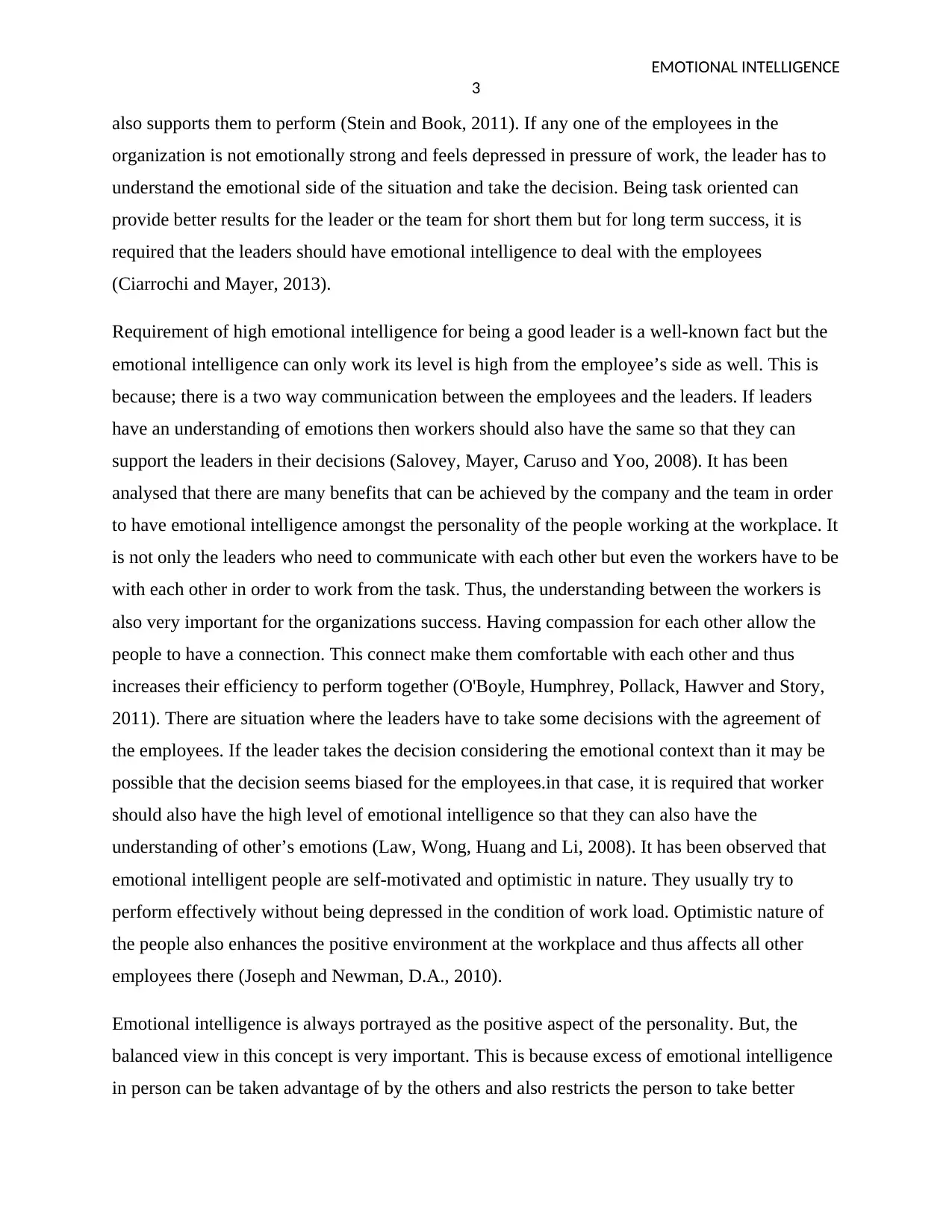
EMOTIONAL INTELLIGENCE
3
also supports them to perform (Stein and Book, 2011). If any one of the employees in the
organization is not emotionally strong and feels depressed in pressure of work, the leader has to
understand the emotional side of the situation and take the decision. Being task oriented can
provide better results for the leader or the team for short them but for long term success, it is
required that the leaders should have emotional intelligence to deal with the employees
(Ciarrochi and Mayer, 2013).
Requirement of high emotional intelligence for being a good leader is a well-known fact but the
emotional intelligence can only work its level is high from the employee’s side as well. This is
because; there is a two way communication between the employees and the leaders. If leaders
have an understanding of emotions then workers should also have the same so that they can
support the leaders in their decisions (Salovey, Mayer, Caruso and Yoo, 2008). It has been
analysed that there are many benefits that can be achieved by the company and the team in order
to have emotional intelligence amongst the personality of the people working at the workplace. It
is not only the leaders who need to communicate with each other but even the workers have to be
with each other in order to work from the task. Thus, the understanding between the workers is
also very important for the organizations success. Having compassion for each other allow the
people to have a connection. This connect make them comfortable with each other and thus
increases their efficiency to perform together (O'Boyle, Humphrey, Pollack, Hawver and Story,
2011). There are situation where the leaders have to take some decisions with the agreement of
the employees. If the leader takes the decision considering the emotional context than it may be
possible that the decision seems biased for the employees.in that case, it is required that worker
should also have the high level of emotional intelligence so that they can also have the
understanding of other’s emotions (Law, Wong, Huang and Li, 2008). It has been observed that
emotional intelligent people are self-motivated and optimistic in nature. They usually try to
perform effectively without being depressed in the condition of work load. Optimistic nature of
the people also enhances the positive environment at the workplace and thus affects all other
employees there (Joseph and Newman, D.A., 2010).
Emotional intelligence is always portrayed as the positive aspect of the personality. But, the
balanced view in this concept is very important. This is because excess of emotional intelligence
in person can be taken advantage of by the others and also restricts the person to take better
3
also supports them to perform (Stein and Book, 2011). If any one of the employees in the
organization is not emotionally strong and feels depressed in pressure of work, the leader has to
understand the emotional side of the situation and take the decision. Being task oriented can
provide better results for the leader or the team for short them but for long term success, it is
required that the leaders should have emotional intelligence to deal with the employees
(Ciarrochi and Mayer, 2013).
Requirement of high emotional intelligence for being a good leader is a well-known fact but the
emotional intelligence can only work its level is high from the employee’s side as well. This is
because; there is a two way communication between the employees and the leaders. If leaders
have an understanding of emotions then workers should also have the same so that they can
support the leaders in their decisions (Salovey, Mayer, Caruso and Yoo, 2008). It has been
analysed that there are many benefits that can be achieved by the company and the team in order
to have emotional intelligence amongst the personality of the people working at the workplace. It
is not only the leaders who need to communicate with each other but even the workers have to be
with each other in order to work from the task. Thus, the understanding between the workers is
also very important for the organizations success. Having compassion for each other allow the
people to have a connection. This connect make them comfortable with each other and thus
increases their efficiency to perform together (O'Boyle, Humphrey, Pollack, Hawver and Story,
2011). There are situation where the leaders have to take some decisions with the agreement of
the employees. If the leader takes the decision considering the emotional context than it may be
possible that the decision seems biased for the employees.in that case, it is required that worker
should also have the high level of emotional intelligence so that they can also have the
understanding of other’s emotions (Law, Wong, Huang and Li, 2008). It has been observed that
emotional intelligent people are self-motivated and optimistic in nature. They usually try to
perform effectively without being depressed in the condition of work load. Optimistic nature of
the people also enhances the positive environment at the workplace and thus affects all other
employees there (Joseph and Newman, D.A., 2010).
Emotional intelligence is always portrayed as the positive aspect of the personality. But, the
balanced view in this concept is very important. This is because excess of emotional intelligence
in person can be taken advantage of by the others and also restricts the person to take better
Paraphrase This Document
Need a fresh take? Get an instant paraphrase of this document with our AI Paraphraser
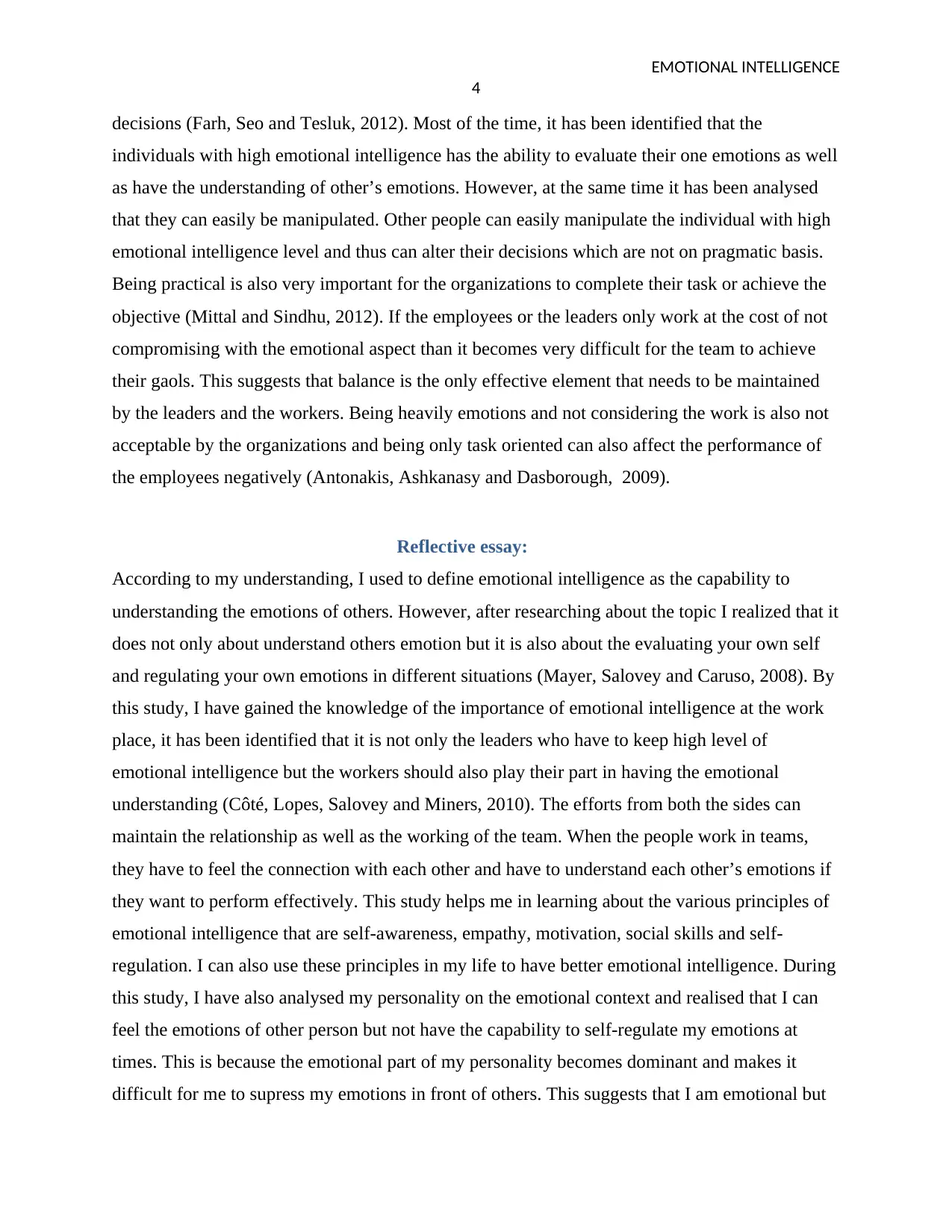
EMOTIONAL INTELLIGENCE
4
decisions (Farh, Seo and Tesluk, 2012). Most of the time, it has been identified that the
individuals with high emotional intelligence has the ability to evaluate their one emotions as well
as have the understanding of other’s emotions. However, at the same time it has been analysed
that they can easily be manipulated. Other people can easily manipulate the individual with high
emotional intelligence level and thus can alter their decisions which are not on pragmatic basis.
Being practical is also very important for the organizations to complete their task or achieve the
objective (Mittal and Sindhu, 2012). If the employees or the leaders only work at the cost of not
compromising with the emotional aspect than it becomes very difficult for the team to achieve
their gaols. This suggests that balance is the only effective element that needs to be maintained
by the leaders and the workers. Being heavily emotions and not considering the work is also not
acceptable by the organizations and being only task oriented can also affect the performance of
the employees negatively (Antonakis, Ashkanasy and Dasborough, 2009).
Reflective essay:
According to my understanding, I used to define emotional intelligence as the capability to
understanding the emotions of others. However, after researching about the topic I realized that it
does not only about understand others emotion but it is also about the evaluating your own self
and regulating your own emotions in different situations (Mayer, Salovey and Caruso, 2008). By
this study, I have gained the knowledge of the importance of emotional intelligence at the work
place, it has been identified that it is not only the leaders who have to keep high level of
emotional intelligence but the workers should also play their part in having the emotional
understanding (Côté, Lopes, Salovey and Miners, 2010). The efforts from both the sides can
maintain the relationship as well as the working of the team. When the people work in teams,
they have to feel the connection with each other and have to understand each other’s emotions if
they want to perform effectively. This study helps me in learning about the various principles of
emotional intelligence that are self-awareness, empathy, motivation, social skills and self-
regulation. I can also use these principles in my life to have better emotional intelligence. During
this study, I have also analysed my personality on the emotional context and realised that I can
feel the emotions of other person but not have the capability to self-regulate my emotions at
times. This is because the emotional part of my personality becomes dominant and makes it
difficult for me to supress my emotions in front of others. This suggests that I am emotional but
4
decisions (Farh, Seo and Tesluk, 2012). Most of the time, it has been identified that the
individuals with high emotional intelligence has the ability to evaluate their one emotions as well
as have the understanding of other’s emotions. However, at the same time it has been analysed
that they can easily be manipulated. Other people can easily manipulate the individual with high
emotional intelligence level and thus can alter their decisions which are not on pragmatic basis.
Being practical is also very important for the organizations to complete their task or achieve the
objective (Mittal and Sindhu, 2012). If the employees or the leaders only work at the cost of not
compromising with the emotional aspect than it becomes very difficult for the team to achieve
their gaols. This suggests that balance is the only effective element that needs to be maintained
by the leaders and the workers. Being heavily emotions and not considering the work is also not
acceptable by the organizations and being only task oriented can also affect the performance of
the employees negatively (Antonakis, Ashkanasy and Dasborough, 2009).
Reflective essay:
According to my understanding, I used to define emotional intelligence as the capability to
understanding the emotions of others. However, after researching about the topic I realized that it
does not only about understand others emotion but it is also about the evaluating your own self
and regulating your own emotions in different situations (Mayer, Salovey and Caruso, 2008). By
this study, I have gained the knowledge of the importance of emotional intelligence at the work
place, it has been identified that it is not only the leaders who have to keep high level of
emotional intelligence but the workers should also play their part in having the emotional
understanding (Côté, Lopes, Salovey and Miners, 2010). The efforts from both the sides can
maintain the relationship as well as the working of the team. When the people work in teams,
they have to feel the connection with each other and have to understand each other’s emotions if
they want to perform effectively. This study helps me in learning about the various principles of
emotional intelligence that are self-awareness, empathy, motivation, social skills and self-
regulation. I can also use these principles in my life to have better emotional intelligence. During
this study, I have also analysed my personality on the emotional context and realised that I can
feel the emotions of other person but not have the capability to self-regulate my emotions at
times. This is because the emotional part of my personality becomes dominant and makes it
difficult for me to supress my emotions in front of others. This suggests that I am emotional but
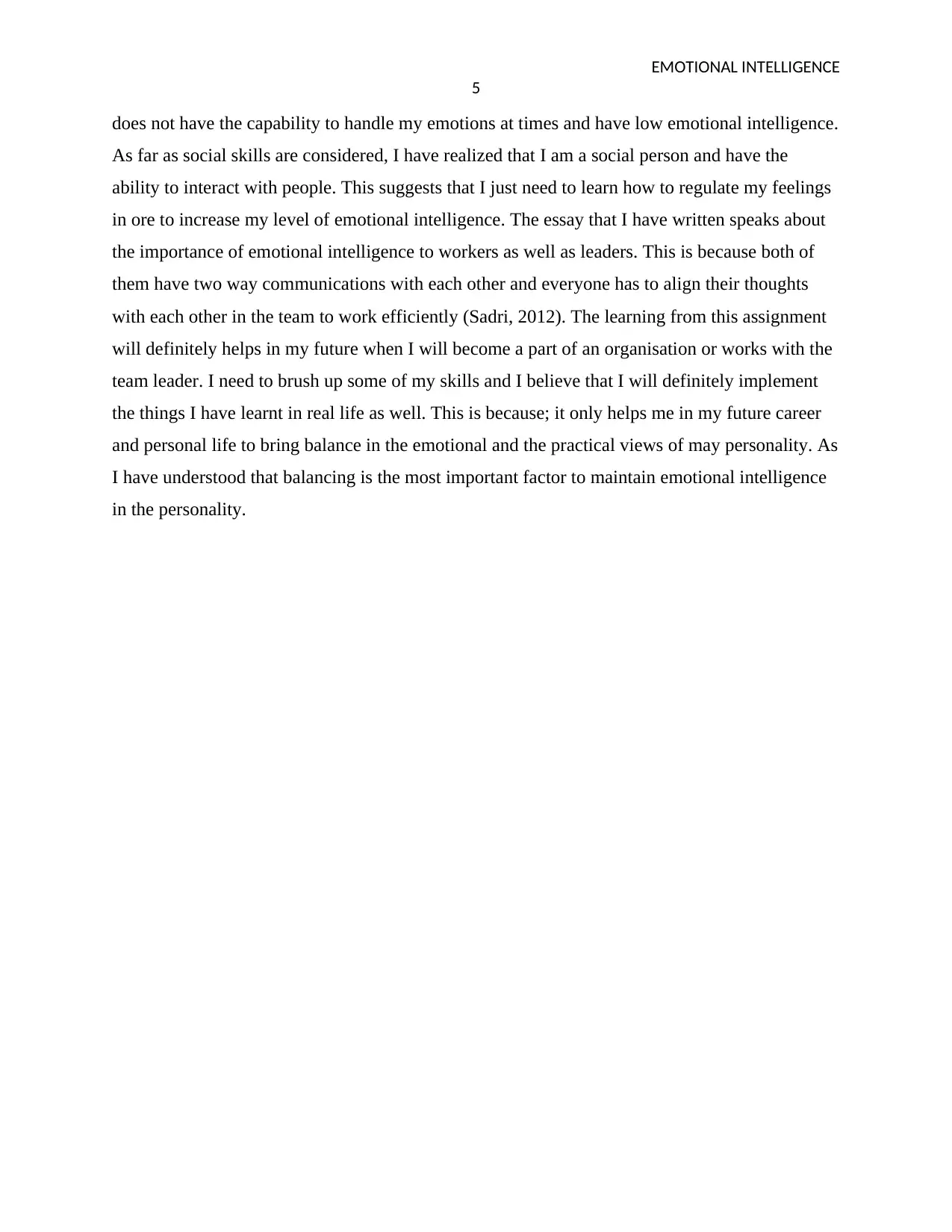
EMOTIONAL INTELLIGENCE
5
does not have the capability to handle my emotions at times and have low emotional intelligence.
As far as social skills are considered, I have realized that I am a social person and have the
ability to interact with people. This suggests that I just need to learn how to regulate my feelings
in ore to increase my level of emotional intelligence. The essay that I have written speaks about
the importance of emotional intelligence to workers as well as leaders. This is because both of
them have two way communications with each other and everyone has to align their thoughts
with each other in the team to work efficiently (Sadri, 2012). The learning from this assignment
will definitely helps in my future when I will become a part of an organisation or works with the
team leader. I need to brush up some of my skills and I believe that I will definitely implement
the things I have learnt in real life as well. This is because; it only helps me in my future career
and personal life to bring balance in the emotional and the practical views of may personality. As
I have understood that balancing is the most important factor to maintain emotional intelligence
in the personality.
5
does not have the capability to handle my emotions at times and have low emotional intelligence.
As far as social skills are considered, I have realized that I am a social person and have the
ability to interact with people. This suggests that I just need to learn how to regulate my feelings
in ore to increase my level of emotional intelligence. The essay that I have written speaks about
the importance of emotional intelligence to workers as well as leaders. This is because both of
them have two way communications with each other and everyone has to align their thoughts
with each other in the team to work efficiently (Sadri, 2012). The learning from this assignment
will definitely helps in my future when I will become a part of an organisation or works with the
team leader. I need to brush up some of my skills and I believe that I will definitely implement
the things I have learnt in real life as well. This is because; it only helps me in my future career
and personal life to bring balance in the emotional and the practical views of may personality. As
I have understood that balancing is the most important factor to maintain emotional intelligence
in the personality.
⊘ This is a preview!⊘
Do you want full access?
Subscribe today to unlock all pages.

Trusted by 1+ million students worldwide
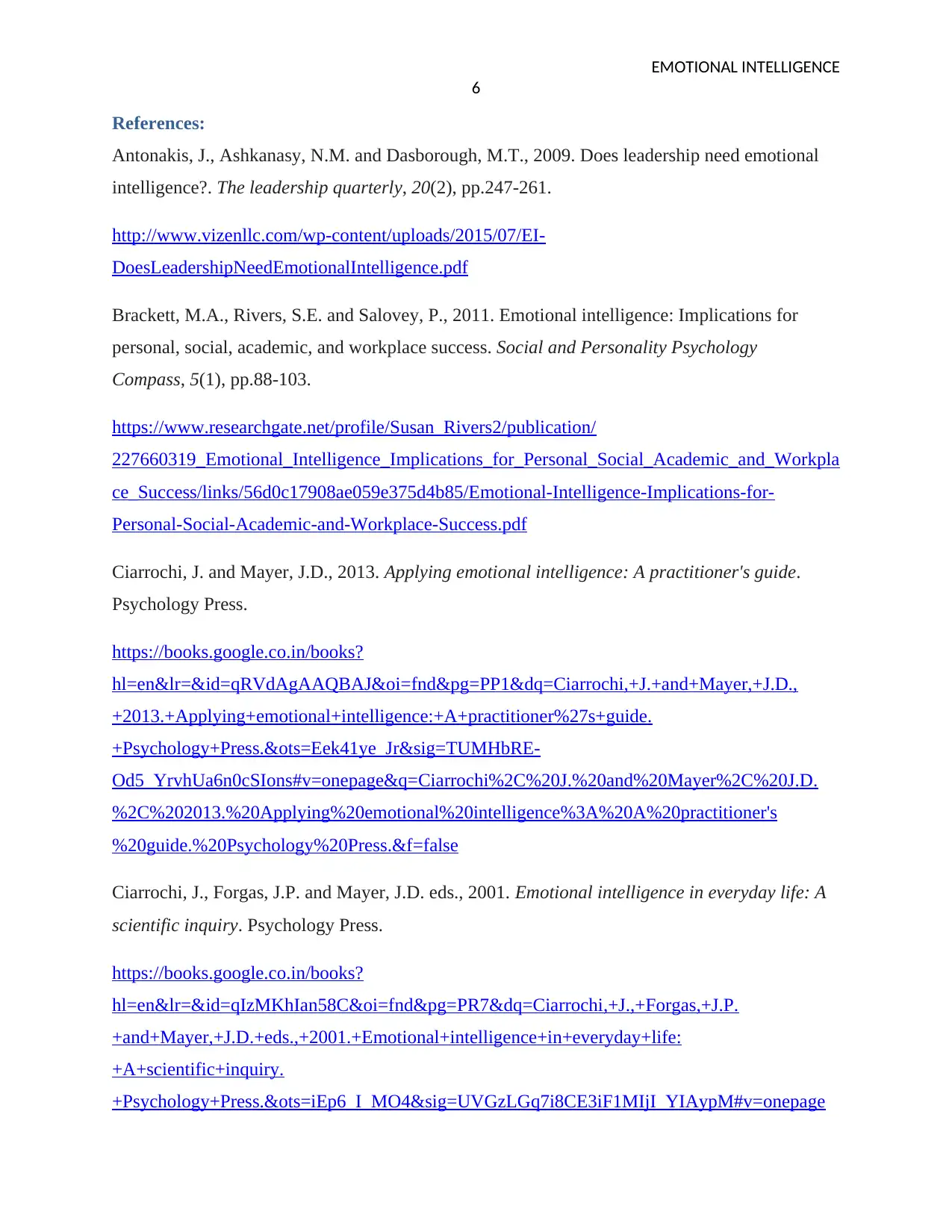
EMOTIONAL INTELLIGENCE
6
References:
Antonakis, J., Ashkanasy, N.M. and Dasborough, M.T., 2009. Does leadership need emotional
intelligence?. The leadership quarterly, 20(2), pp.247-261.
http://www.vizenllc.com/wp-content/uploads/2015/07/EI-
DoesLeadershipNeedEmotionalIntelligence.pdf
Brackett, M.A., Rivers, S.E. and Salovey, P., 2011. Emotional intelligence: Implications for
personal, social, academic, and workplace success. Social and Personality Psychology
Compass, 5(1), pp.88-103.
https://www.researchgate.net/profile/Susan_Rivers2/publication/
227660319_Emotional_Intelligence_Implications_for_Personal_Social_Academic_and_Workpla
ce_Success/links/56d0c17908ae059e375d4b85/Emotional-Intelligence-Implications-for-
Personal-Social-Academic-and-Workplace-Success.pdf
Ciarrochi, J. and Mayer, J.D., 2013. Applying emotional intelligence: A practitioner's guide.
Psychology Press.
https://books.google.co.in/books?
hl=en&lr=&id=qRVdAgAAQBAJ&oi=fnd&pg=PP1&dq=Ciarrochi,+J.+and+Mayer,+J.D.,
+2013.+Applying+emotional+intelligence:+A+practitioner%27s+guide.
+Psychology+Press.&ots=Eek41ye_Jr&sig=TUMHbRE-
Od5_YrvhUa6n0cSIons#v=onepage&q=Ciarrochi%2C%20J.%20and%20Mayer%2C%20J.D.
%2C%202013.%20Applying%20emotional%20intelligence%3A%20A%20practitioner's
%20guide.%20Psychology%20Press.&f=false
Ciarrochi, J., Forgas, J.P. and Mayer, J.D. eds., 2001. Emotional intelligence in everyday life: A
scientific inquiry. Psychology Press.
https://books.google.co.in/books?
hl=en&lr=&id=qIzMKhIan58C&oi=fnd&pg=PR7&dq=Ciarrochi,+J.,+Forgas,+J.P.
+and+Mayer,+J.D.+eds.,+2001.+Emotional+intelligence+in+everyday+life:
+A+scientific+inquiry.
+Psychology+Press.&ots=iEp6_I_MO4&sig=UVGzLGq7i8CE3iF1MIjI_YIAypM#v=onepage
6
References:
Antonakis, J., Ashkanasy, N.M. and Dasborough, M.T., 2009. Does leadership need emotional
intelligence?. The leadership quarterly, 20(2), pp.247-261.
http://www.vizenllc.com/wp-content/uploads/2015/07/EI-
DoesLeadershipNeedEmotionalIntelligence.pdf
Brackett, M.A., Rivers, S.E. and Salovey, P., 2011. Emotional intelligence: Implications for
personal, social, academic, and workplace success. Social and Personality Psychology
Compass, 5(1), pp.88-103.
https://www.researchgate.net/profile/Susan_Rivers2/publication/
227660319_Emotional_Intelligence_Implications_for_Personal_Social_Academic_and_Workpla
ce_Success/links/56d0c17908ae059e375d4b85/Emotional-Intelligence-Implications-for-
Personal-Social-Academic-and-Workplace-Success.pdf
Ciarrochi, J. and Mayer, J.D., 2013. Applying emotional intelligence: A practitioner's guide.
Psychology Press.
https://books.google.co.in/books?
hl=en&lr=&id=qRVdAgAAQBAJ&oi=fnd&pg=PP1&dq=Ciarrochi,+J.+and+Mayer,+J.D.,
+2013.+Applying+emotional+intelligence:+A+practitioner%27s+guide.
+Psychology+Press.&ots=Eek41ye_Jr&sig=TUMHbRE-
Od5_YrvhUa6n0cSIons#v=onepage&q=Ciarrochi%2C%20J.%20and%20Mayer%2C%20J.D.
%2C%202013.%20Applying%20emotional%20intelligence%3A%20A%20practitioner's
%20guide.%20Psychology%20Press.&f=false
Ciarrochi, J., Forgas, J.P. and Mayer, J.D. eds., 2001. Emotional intelligence in everyday life: A
scientific inquiry. Psychology Press.
https://books.google.co.in/books?
hl=en&lr=&id=qIzMKhIan58C&oi=fnd&pg=PR7&dq=Ciarrochi,+J.,+Forgas,+J.P.
+and+Mayer,+J.D.+eds.,+2001.+Emotional+intelligence+in+everyday+life:
+A+scientific+inquiry.
+Psychology+Press.&ots=iEp6_I_MO4&sig=UVGzLGq7i8CE3iF1MIjI_YIAypM#v=onepage
Paraphrase This Document
Need a fresh take? Get an instant paraphrase of this document with our AI Paraphraser
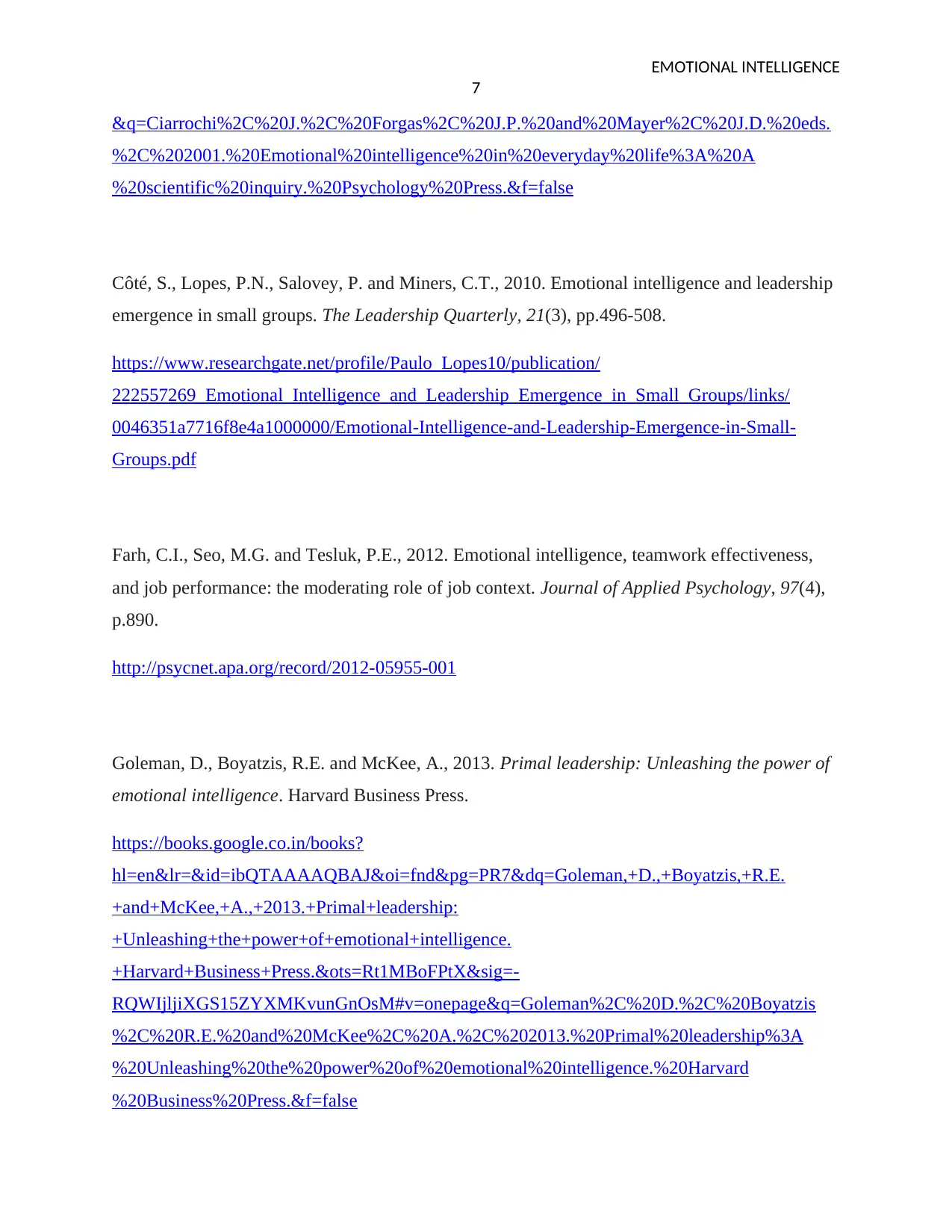
EMOTIONAL INTELLIGENCE
7
&q=Ciarrochi%2C%20J.%2C%20Forgas%2C%20J.P.%20and%20Mayer%2C%20J.D.%20eds.
%2C%202001.%20Emotional%20intelligence%20in%20everyday%20life%3A%20A
%20scientific%20inquiry.%20Psychology%20Press.&f=false
Côté, S., Lopes, P.N., Salovey, P. and Miners, C.T., 2010. Emotional intelligence and leadership
emergence in small groups. The Leadership Quarterly, 21(3), pp.496-508.
https://www.researchgate.net/profile/Paulo_Lopes10/publication/
222557269_Emotional_Intelligence_and_Leadership_Emergence_in_Small_Groups/links/
0046351a7716f8e4a1000000/Emotional-Intelligence-and-Leadership-Emergence-in-Small-
Groups.pdf
Farh, C.I., Seo, M.G. and Tesluk, P.E., 2012. Emotional intelligence, teamwork effectiveness,
and job performance: the moderating role of job context. Journal of Applied Psychology, 97(4),
p.890.
http://psycnet.apa.org/record/2012-05955-001
Goleman, D., Boyatzis, R.E. and McKee, A., 2013. Primal leadership: Unleashing the power of
emotional intelligence. Harvard Business Press.
https://books.google.co.in/books?
hl=en&lr=&id=ibQTAAAAQBAJ&oi=fnd&pg=PR7&dq=Goleman,+D.,+Boyatzis,+R.E.
+and+McKee,+A.,+2013.+Primal+leadership:
+Unleashing+the+power+of+emotional+intelligence.
+Harvard+Business+Press.&ots=Rt1MBoFPtX&sig=-
RQWIjljiXGS15ZYXMKvunGnOsM#v=onepage&q=Goleman%2C%20D.%2C%20Boyatzis
%2C%20R.E.%20and%20McKee%2C%20A.%2C%202013.%20Primal%20leadership%3A
%20Unleashing%20the%20power%20of%20emotional%20intelligence.%20Harvard
%20Business%20Press.&f=false
7
&q=Ciarrochi%2C%20J.%2C%20Forgas%2C%20J.P.%20and%20Mayer%2C%20J.D.%20eds.
%2C%202001.%20Emotional%20intelligence%20in%20everyday%20life%3A%20A
%20scientific%20inquiry.%20Psychology%20Press.&f=false
Côté, S., Lopes, P.N., Salovey, P. and Miners, C.T., 2010. Emotional intelligence and leadership
emergence in small groups. The Leadership Quarterly, 21(3), pp.496-508.
https://www.researchgate.net/profile/Paulo_Lopes10/publication/
222557269_Emotional_Intelligence_and_Leadership_Emergence_in_Small_Groups/links/
0046351a7716f8e4a1000000/Emotional-Intelligence-and-Leadership-Emergence-in-Small-
Groups.pdf
Farh, C.I., Seo, M.G. and Tesluk, P.E., 2012. Emotional intelligence, teamwork effectiveness,
and job performance: the moderating role of job context. Journal of Applied Psychology, 97(4),
p.890.
http://psycnet.apa.org/record/2012-05955-001
Goleman, D., Boyatzis, R.E. and McKee, A., 2013. Primal leadership: Unleashing the power of
emotional intelligence. Harvard Business Press.
https://books.google.co.in/books?
hl=en&lr=&id=ibQTAAAAQBAJ&oi=fnd&pg=PR7&dq=Goleman,+D.,+Boyatzis,+R.E.
+and+McKee,+A.,+2013.+Primal+leadership:
+Unleashing+the+power+of+emotional+intelligence.
+Harvard+Business+Press.&ots=Rt1MBoFPtX&sig=-
RQWIjljiXGS15ZYXMKvunGnOsM#v=onepage&q=Goleman%2C%20D.%2C%20Boyatzis
%2C%20R.E.%20and%20McKee%2C%20A.%2C%202013.%20Primal%20leadership%3A
%20Unleashing%20the%20power%20of%20emotional%20intelligence.%20Harvard
%20Business%20Press.&f=false
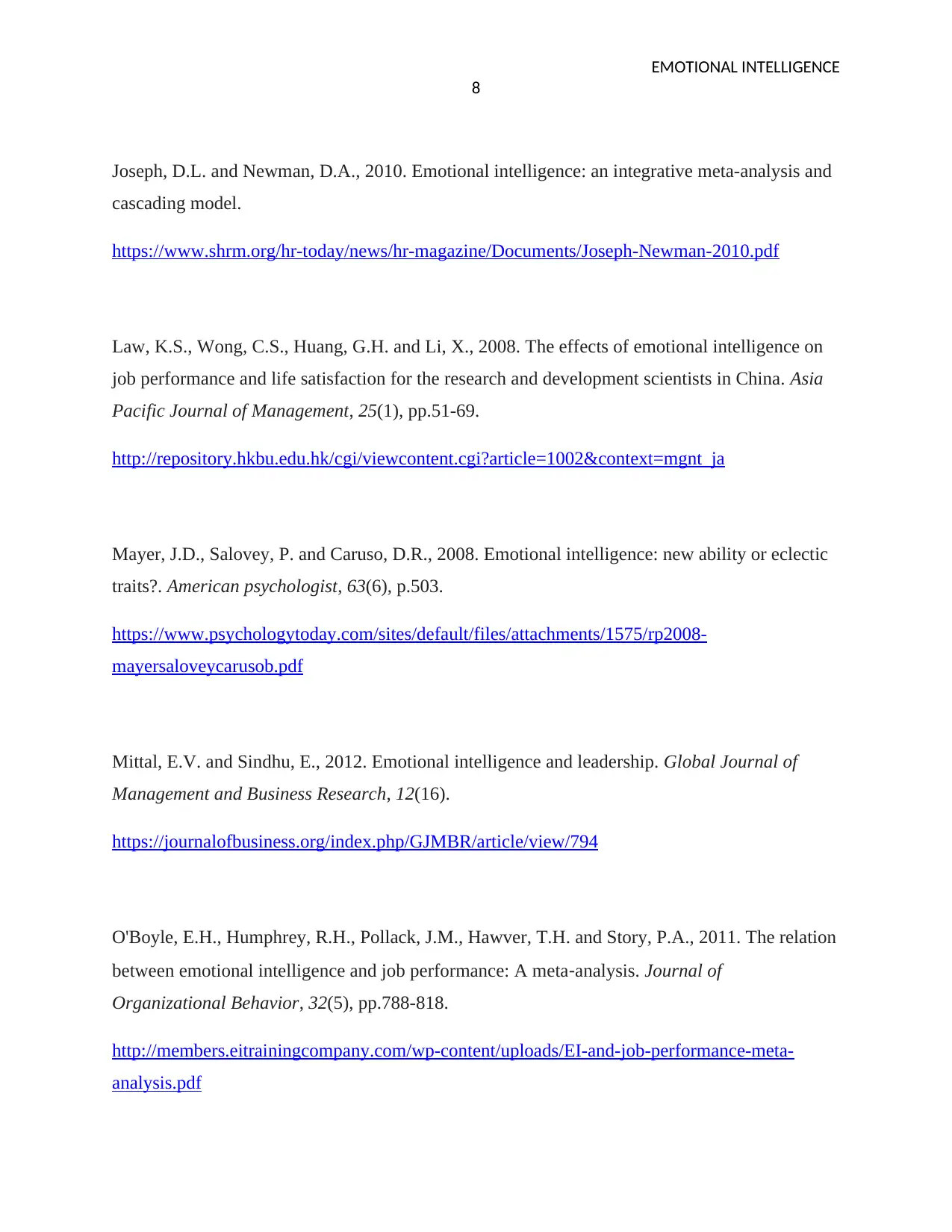
EMOTIONAL INTELLIGENCE
8
Joseph, D.L. and Newman, D.A., 2010. Emotional intelligence: an integrative meta-analysis and
cascading model.
https://www.shrm.org/hr-today/news/hr-magazine/Documents/Joseph-Newman-2010.pdf
Law, K.S., Wong, C.S., Huang, G.H. and Li, X., 2008. The effects of emotional intelligence on
job performance and life satisfaction for the research and development scientists in China. Asia
Pacific Journal of Management, 25(1), pp.51-69.
http://repository.hkbu.edu.hk/cgi/viewcontent.cgi?article=1002&context=mgnt_ja
Mayer, J.D., Salovey, P. and Caruso, D.R., 2008. Emotional intelligence: new ability or eclectic
traits?. American psychologist, 63(6), p.503.
https://www.psychologytoday.com/sites/default/files/attachments/1575/rp2008-
mayersaloveycarusob.pdf
Mittal, E.V. and Sindhu, E., 2012. Emotional intelligence and leadership. Global Journal of
Management and Business Research, 12(16).
https://journalofbusiness.org/index.php/GJMBR/article/view/794
O'Boyle, E.H., Humphrey, R.H., Pollack, J.M., Hawver, T.H. and Story, P.A., 2011. The relation
between emotional intelligence and job performance: A meta‐analysis. Journal of
Organizational Behavior, 32(5), pp.788-818.
http://members.eitrainingcompany.com/wp-content/uploads/EI-and-job-performance-meta-
analysis.pdf
8
Joseph, D.L. and Newman, D.A., 2010. Emotional intelligence: an integrative meta-analysis and
cascading model.
https://www.shrm.org/hr-today/news/hr-magazine/Documents/Joseph-Newman-2010.pdf
Law, K.S., Wong, C.S., Huang, G.H. and Li, X., 2008. The effects of emotional intelligence on
job performance and life satisfaction for the research and development scientists in China. Asia
Pacific Journal of Management, 25(1), pp.51-69.
http://repository.hkbu.edu.hk/cgi/viewcontent.cgi?article=1002&context=mgnt_ja
Mayer, J.D., Salovey, P. and Caruso, D.R., 2008. Emotional intelligence: new ability or eclectic
traits?. American psychologist, 63(6), p.503.
https://www.psychologytoday.com/sites/default/files/attachments/1575/rp2008-
mayersaloveycarusob.pdf
Mittal, E.V. and Sindhu, E., 2012. Emotional intelligence and leadership. Global Journal of
Management and Business Research, 12(16).
https://journalofbusiness.org/index.php/GJMBR/article/view/794
O'Boyle, E.H., Humphrey, R.H., Pollack, J.M., Hawver, T.H. and Story, P.A., 2011. The relation
between emotional intelligence and job performance: A meta‐analysis. Journal of
Organizational Behavior, 32(5), pp.788-818.
http://members.eitrainingcompany.com/wp-content/uploads/EI-and-job-performance-meta-
analysis.pdf
⊘ This is a preview!⊘
Do you want full access?
Subscribe today to unlock all pages.

Trusted by 1+ million students worldwide
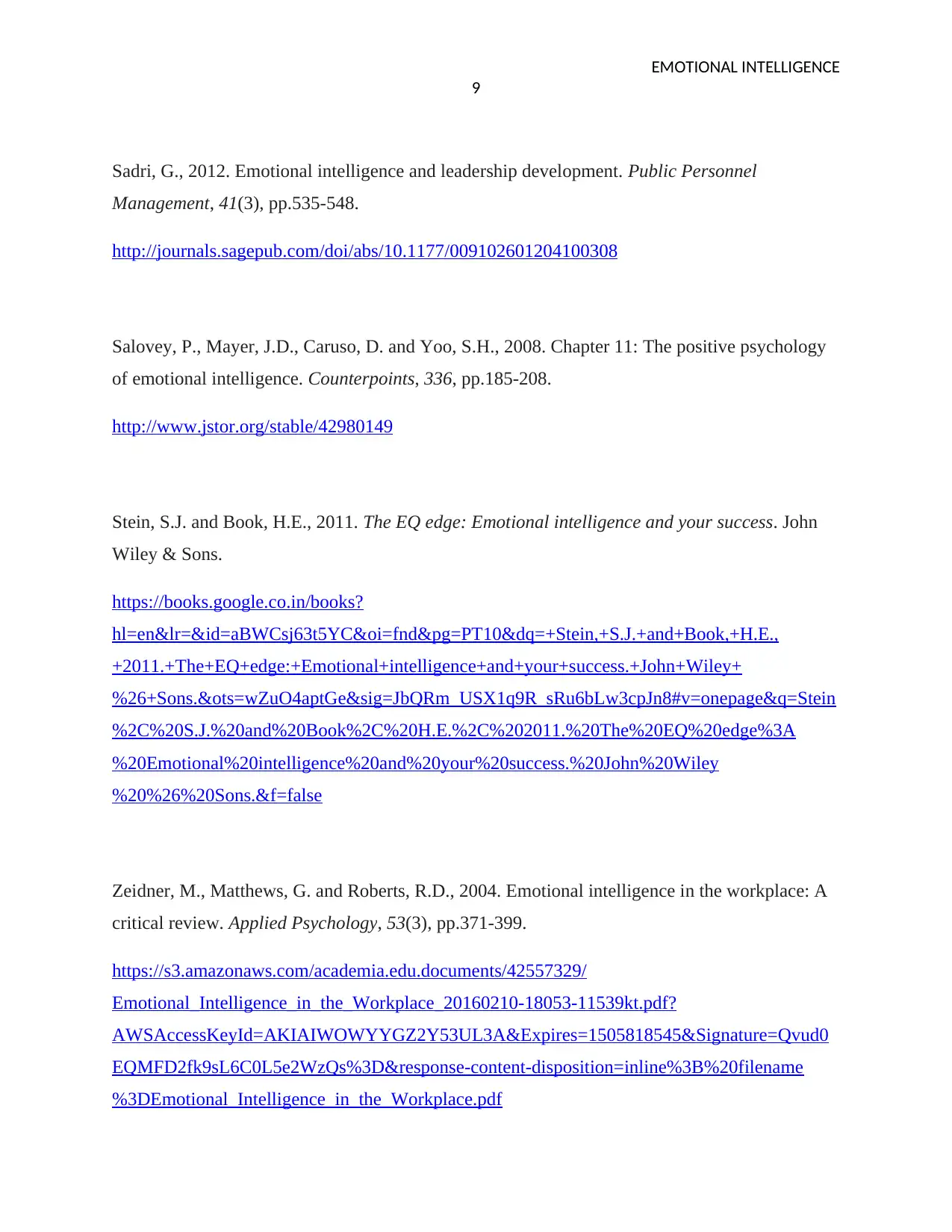
EMOTIONAL INTELLIGENCE
9
Sadri, G., 2012. Emotional intelligence and leadership development. Public Personnel
Management, 41(3), pp.535-548.
http://journals.sagepub.com/doi/abs/10.1177/009102601204100308
Salovey, P., Mayer, J.D., Caruso, D. and Yoo, S.H., 2008. Chapter 11: The positive psychology
of emotional intelligence. Counterpoints, 336, pp.185-208.
http://www.jstor.org/stable/42980149
Stein, S.J. and Book, H.E., 2011. The EQ edge: Emotional intelligence and your success. John
Wiley & Sons.
https://books.google.co.in/books?
hl=en&lr=&id=aBWCsj63t5YC&oi=fnd&pg=PT10&dq=+Stein,+S.J.+and+Book,+H.E.,
+2011.+The+EQ+edge:+Emotional+intelligence+and+your+success.+John+Wiley+
%26+Sons.&ots=wZuO4aptGe&sig=JbQRm_USX1q9R_sRu6bLw3cpJn8#v=onepage&q=Stein
%2C%20S.J.%20and%20Book%2C%20H.E.%2C%202011.%20The%20EQ%20edge%3A
%20Emotional%20intelligence%20and%20your%20success.%20John%20Wiley
%20%26%20Sons.&f=false
Zeidner, M., Matthews, G. and Roberts, R.D., 2004. Emotional intelligence in the workplace: A
critical review. Applied Psychology, 53(3), pp.371-399.
https://s3.amazonaws.com/academia.edu.documents/42557329/
Emotional_Intelligence_in_the_Workplace_20160210-18053-11539kt.pdf?
AWSAccessKeyId=AKIAIWOWYYGZ2Y53UL3A&Expires=1505818545&Signature=Qvud0
EQMFD2fk9sL6C0L5e2WzQs%3D&response-content-disposition=inline%3B%20filename
%3DEmotional_Intelligence_in_the_Workplace.pdf
9
Sadri, G., 2012. Emotional intelligence and leadership development. Public Personnel
Management, 41(3), pp.535-548.
http://journals.sagepub.com/doi/abs/10.1177/009102601204100308
Salovey, P., Mayer, J.D., Caruso, D. and Yoo, S.H., 2008. Chapter 11: The positive psychology
of emotional intelligence. Counterpoints, 336, pp.185-208.
http://www.jstor.org/stable/42980149
Stein, S.J. and Book, H.E., 2011. The EQ edge: Emotional intelligence and your success. John
Wiley & Sons.
https://books.google.co.in/books?
hl=en&lr=&id=aBWCsj63t5YC&oi=fnd&pg=PT10&dq=+Stein,+S.J.+and+Book,+H.E.,
+2011.+The+EQ+edge:+Emotional+intelligence+and+your+success.+John+Wiley+
%26+Sons.&ots=wZuO4aptGe&sig=JbQRm_USX1q9R_sRu6bLw3cpJn8#v=onepage&q=Stein
%2C%20S.J.%20and%20Book%2C%20H.E.%2C%202011.%20The%20EQ%20edge%3A
%20Emotional%20intelligence%20and%20your%20success.%20John%20Wiley
%20%26%20Sons.&f=false
Zeidner, M., Matthews, G. and Roberts, R.D., 2004. Emotional intelligence in the workplace: A
critical review. Applied Psychology, 53(3), pp.371-399.
https://s3.amazonaws.com/academia.edu.documents/42557329/
Emotional_Intelligence_in_the_Workplace_20160210-18053-11539kt.pdf?
AWSAccessKeyId=AKIAIWOWYYGZ2Y53UL3A&Expires=1505818545&Signature=Qvud0
EQMFD2fk9sL6C0L5e2WzQs%3D&response-content-disposition=inline%3B%20filename
%3DEmotional_Intelligence_in_the_Workplace.pdf
Paraphrase This Document
Need a fresh take? Get an instant paraphrase of this document with our AI Paraphraser

EMOTIONAL INTELLIGENCE
10
10
1 out of 11
Related Documents
Your All-in-One AI-Powered Toolkit for Academic Success.
+13062052269
info@desklib.com
Available 24*7 on WhatsApp / Email
![[object Object]](/_next/static/media/star-bottom.7253800d.svg)
Unlock your academic potential
Copyright © 2020–2026 A2Z Services. All Rights Reserved. Developed and managed by ZUCOL.




